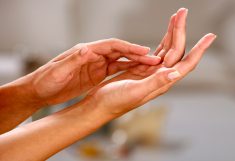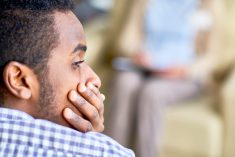Snoring can be more than a nuisance. It can have negative consequences too, and it is important to know it may be a sign of sleep apnea.
Sleep relaxes the soft tissues in the roof of the mouth (i.e. the soft palate) and in both your throat and your tongue. Snoring is the sound that air makes passing over these relaxed tissues, much like air passing over the reeds in an oboe when it makes music.
The distinction, however, is that when the relaxed tissues block airways, sleep apnea actually stops you from breathing for anywhere from 10 to 15 seconds. This pattern can occur from five to 30 times each night, making it difficult to get deep, restful sleep.
Read Also

‘No agenda, no attenda’: How to professionalize your family farm meetings
Establishing meeting ground rules can help a farm family find ways to communicate that work for the business and the family.
Most everyone snores from time to time. By contrast, it is estimated only about 6 per cent of Canadians experience sleep apnea. (This number may be low because many people decide to self-treat their symptoms.)
Besides snoring, which can be very loud, sleep apnea can lead to a dry mouth, gasping for air during sleep, morning headache, daytime drowsiness, irritability, and difficulty sleeping. Often a bed partner may notice the breathing symptoms, including snoring, with the affected person complaining of poor sleep quality and daytime tiredness.
Some people are more at risk for sleep apnea, for example overweight individuals and people with narrowed airways due to tonsils or adenoids. Also at higher risk are those with a family history of sleep apnea or who have thicker necks with narrower airways.
Sleep apnea occurs generally in adults, not children, and it becomes more common with age.
Smokers are three times more likely to experience sleep apnea. Any medications that relax muscles in the mouth, throat or tongue can contribute to sleep apnea too, for example alcohol, anti-anxiety medications, muscle relaxants and narcotic pain relievers. If you have nasal congestion due to conditions like allergies, colds or even nasal polyps, then breathing through the mouth may result in snoring and sleep apnea.
Men are two or three times more likely to experience snoring and sleep apnea, although with age and with the menopausal decline in hormones, women increase their risk.
Often medical conditions contribute to sleep apnea. Congestive heart failure, high blood pressure, diabetes, Parkinson’s disease, stroke, asthma, and chronic obstructive pulmonary disease (COPD) increase the risk and can worsen existing problems. As well, sudden drops in blood oxygenation that occur with sleep apnea can have an impact on cardiovascular health.
Complications after major surgery are possible with sleep apnea since recovery may require lying flat on the back, worsening breathing.
Obviously, opening your airways and keeping them open will reduce both snoring and sleep apnea. Self-adhesive nasal strips will keep nasal passages open and may help breathing. Elevating the head of the bed by placing several books or bricks under the legs at the head of the bed or by using a wedge-shaped pillow or mattress insert will enable gravity to keep relaxed tissues from blocking the airways. Some beds have an option for elevating the head of the bed. Sleeping on piled-up pillows won’t work because during the night the pillows will slip.
A continuous positive airway pressure (i.e. CPAP) mask and machine is the recommended treatment for sleep apnea. However, these can be uncomfortable and claustrophobic. Some are automatic machines that adjust the pressure on their own while others can be set by the user.
They all deliver a steady stream of air to the sleeper preventing both snoring and sleep apnea. Humidification is needed to keep airway tissues from being damaged, and regular cleaning is essential.
The key is not to ignore either snoring or sleep apnea. Instead, look for an underlying cause and take measures to reduce the health impact.















